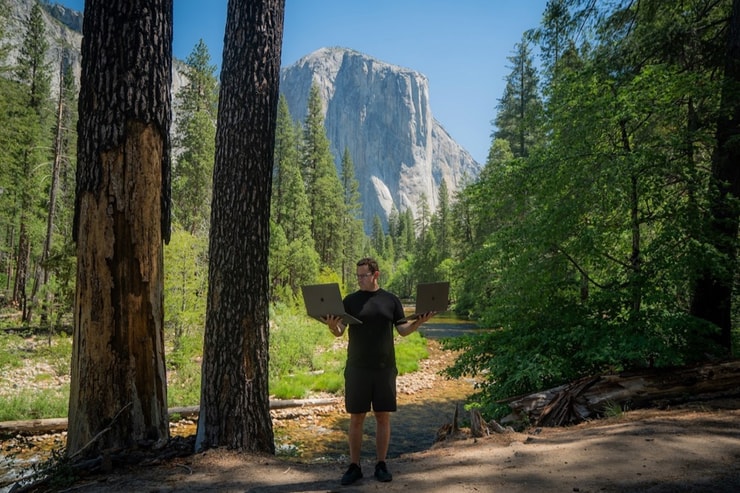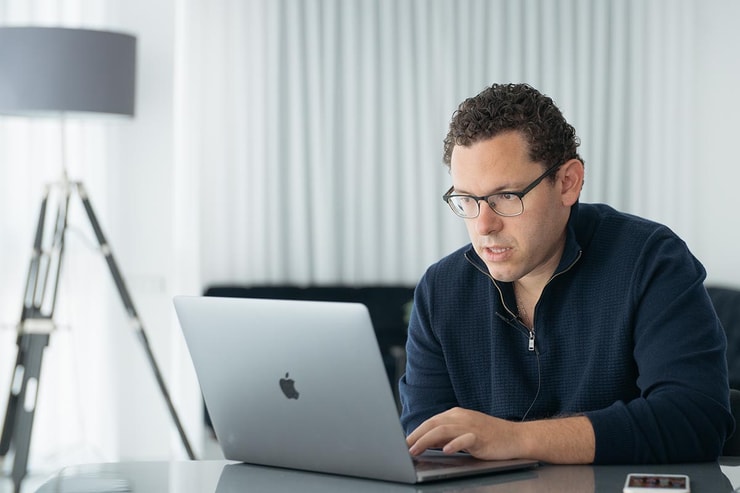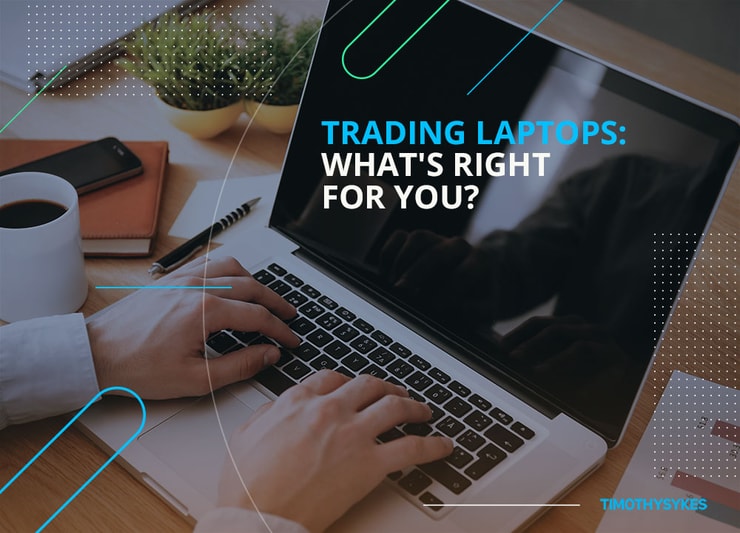You don’t need a fancy degree or license to get into the markets — but traders do need solid trading laptops.
It can be super easy to start trading these days … All you need is an internet connection, a brokerage account, and a computer. And with so few necessary components, it’s extra important to seek out high quality.
Since I’m not into being chained to a desk all day, and I travel often, I’m all about laptop computers.
An amazing laptop in and of itself won’t make you a great trader (sorry), but it can make a huge difference in your trading. After all, if you can’t perform the necessary tasks without your laptop crashing, it can really cramp your style.
What kind of laptop’s right for you? With so many options available, it’s easy to get decision fatigue. There’s no one right choice … Every trader’s preference will be different. You need to balance your specific needs with price, size, reliability, etc.
But since I live to give, today I’ll share my personal input on what to look for in a trading laptop and some specific suggestions for laptops that meet my standards.
Table of Contents
What Kind of Laptop Do I Use?

One of my most commonly asked questions is what kind of laptop I personally use for trading. Drumroll, please…
I use a MacBook Pro. As I recently shared on YouTube, while I own several laptops, I pretty much do all my trading from a single MacBook Pro. But I travel with a backup … just in case.
I love my laptop. But this doesn’t mean that’s the right choice for you — as you’ll see in a bit, there are plenty of different options.
Top Trading Laptops
This is what you came for: my suggestions for trading laptops. I’ve compiled a list of some strong contenders that represent a variety of different price points and different features for traders. Here they are:
TimothySykes.com is a participant in the Amazon Services LLC Associates Program, an affiliate advertising program designed to provide a means for sites to earn advertising fees by advertising and linking to Amazon.com.
MacBook Pro (Quad Core)
Why I like it: I’m a Mac guy. I like the design, the speed, and how it works. I’ve loved and lost multiple Macs (including dropping one in a pool … Go ahead, watch me scream like a baby). But I keep getting new ones, so you could say I’m a fan.
The MacBook Pro is available in a variety of screen sizes, so you can choose the model that works best for you. It has a strong 7th generation Intel Core processor, meaning it performs really well, even when you’ve got multiple windows open.
Best of all, the video quality is incredible, meaning you can watch all my lessons with zero hiccups or stalling.
And the display is awesome — perfect for watching charts and making sure you see your setups in living color.
The battery life is great for a laptop, too. Yep: I love my Mac.
Acer Aspire E 15
Why I like it: This is a solid laptop for newbie traders. It’s relatively inexpensive, has a decent size, decent RAM, and a solid processor.
I wouldn’t say it’s the most amazing laptop in the world, but I will say it’s solidly decent and a good value. The 15.6 inch display is good, and so is the color.
It’s got an 8th generation Intel Core i5-8250U processor, which is sufficient for toggling between multiple screens and programs as needed for trading.
While the RAM and SSD hard drive are good — not great — they can both be upgraded easily, so you can grow with this laptop.
ASUS ZenBook 14 UX430
Why I like it: If you’re looking for a good, affordable laptop, this is one to consider. It’s got a lot going for it at a good price.
At just 2.75 pounds, this is a super lightweight laptop with a slick-looking nano edge bezel display.
It’s got a high-resolution display, good color, and good visuals — the display isn’t too hard on the eyes thanks to wide viewing angles.
It also has an 8th generation Intel 1.8 GHz processor, and great memory and storage.
Asus ZenBook 13 UX331UN
Why I like it: This is like the above Asus ZenBook 14’s younger sibling. It’s a little smaller, a little lighter, and a little less expensive.
Technology-wise, it’s comparable to the ZenBook 14, with maybe a little less oomph. But if you’re a trader who travels a lot, this lightweight laptop could be a good pick.
Dell XPS 15
Why I like it: The borderless display. This laptop has a thin profile and an optional touch screen. Overall, a great display.
It’s got also an anti-reflective screen, which can make a pretty big difference when you’re staring at a screen studying charts all day. Your eyes will thank you.
It’s a pretty strong machine for its relatively small size, with an Intel Core i7-6700HQ Quad Core processor that can ably handle running programs like StocksToTrade while you’re in my chat rooms and researching stocks at the same time.
Huawei MateBook X Pro
Why I like it: This is an extremely slim and lightweight laptop, weighing in at less than three pounds.
It’s got a decently sized 13.9-inch touch screen, and the hi-res display means that you can view streaming content, so it’s perfect for watching my videos and webinars.
In terms of strength, it’s got an Intel Core i5 8250U processor. If that doesn’t mean much to you, let me tell you in layman’s terms: it’s more than 40% faster than the previous generation of the same laptop.
Lenovo Y700
Why I like it: It’s a powerful machine.
Did you know that so-called “gaming” computers are frequently a good choice for traders? That’s because they put a lot of emphasis on graphics and running fast-moving programs — both helpful for running trading programs.
This is a good-quality laptop, with an aluminum wrap and a plastic body.
Display-wise, it has an awesome graphics card … maybe even better than the MacBook Pro.
It also has an impressive amount of RAM (16GB DDR4) and a great processor, Intel’s 6th generation i7 processor.
Weight-wise, it’s on the heftier side at about 5.7 pounds. However, the power that you get from it might be worth it. It does have a good battery life, and you’ll get a few hours of work in before you need to charge.
Before You Buy

There are certain things you’ll want to think about before purchasing a laptop for trading.
After all, the requirements for a trading laptop will be a bit different than if you were just buying a laptop for checking email and shopping online.
Trading software can drain the battery and challenge your processor … So it’s important to invest in a machine that can handle all the programs and software you’ll be using.
With that in mind, consider these factors strongly before you buy any laptop…
Battery Life
Imagine this: You find the perfect trading setup. It meets every single one of your criteria. This is the big one. You’re about to click the “execute” button … when your laptop battery dies.
That might seem dramatic, but things like this can (and will) happen when trading. So battery life is a big deal, especially if you’re like me. I often trade on the go and don’t always have access to an outlet.
It’s worth mentioning that your battery will pretty much never last quite as long as the manufacturer says, especially with trading software running. But finding a laptop with a long battery life is always a good idea.
Display and Screen Size
You’ll be staring at your screen for long stretches of time, so you want a machine that’s easy on the eyes.
Think about where you’ll be working and the light conditions. Will it be in your basement, where light is limited? Or in an office facing the sun? Choose a laptop with a display that’s well suited to the types of places where you’ll most likely be working.
Think about the right screen size, too. While a small screen might make your laptop easier to tote around, it can also be hard on the eyes to read charts on a tiny screen. A decent enough screen size to make viewing stock charts easy will make your life much easier.
More Breaking News
- Mattel Faces Market Concerns: Shares Tumble Amid Revenue and Earnings Miss
- Snap Faces Mounting Challenges as Analysts Lower Price Targets
- Breaking News: Ondas Navigates Market with Enhanced Strategy
- Strategic Moves Propel CCH Holdings: Stock Soars
Hard Drive
The hard drive is what makes your computer more or less responsive. Traditionally, they’re the little spinny pieces inside of your computer and are measured in revolutions per minute. The faster they spin, the faster your computer is.
But these days, there are other types of hard drives, too. For instance, SSDs, or solid-state drives, are another type that you’ll see. It’s worth noting that in terms of trading platforms, SSDs won’t increase the performance or processing speeds.
You don’t need to go insane with a hard drive, but you do want a decent one. My recommendation? Try to find one over 500 gigabytes.
Processor Speed
Processors are not all created equal. It used to be that you’d just try to find the fastest one that you could, but the many different types of processors out there today defy this kind of simple searching.
Now, there are plenty of different types of processors, including AMD, gigahertz, dual-core, quad-core, i3, i5 … and that’s just a few. They each have advantages and strengths that make it hard to declare one the best.
For example, dual core can be faster than a quad core, but quad core can better handle running multiple programs at once.
So before you buy a laptop, take the time to consider your specific needs and how you might ‘strain’ your machine. Look for a processor that can best meet your needs.
RAM
Most people think that RAM (short for random access memory) makes your computer faster, but that’s not exactly the case.
Look at it more like this: You need sufficient RAM to run your computer programs and keep your computer from slowing down or crashing. In general, it’s better to have too much than too little RAM.
Weight
You might have to be hauling around your laptop for hours if traveling, commuting, or working remotely. Are you able to comfortably lift it? Be sure that it won’t strain your back before you buy!
As a side note, the more the battery power, the heavier the laptop in general. So consider this too. It may be worth dealing with a little extra weight in some circumstances.
Price
Nobody wants to get gouged when buying a laptop. But this isn’t the place to be cheap, either. A laptop is one of your most vital tools as a trader, so I recommend investing in a decent one that can do what you need it to do.
Put it this way: Is it worth getting the cheaper model if it isn’t reliable — and you risk missing out on trading opportunities?
Trading Challenge
A snazzy laptop isn’t the only thing you need to be a great trader. You need an education to match your tech.
Without learning how the market works before you start trading, you’re putting yourself at great risk of blowing up your account. Who wants that?
My Trading Challenge can help you get up to speed.
I created it to help all the traders who asked me for advice after they saw me on shows like “Wall Street Warriors.”
I never had a trading education. I had to learn things the hard way. But why should everyone else have to learn the hard way?
I want to help my students become self-sufficient traders by teaching them what I’ve learned over the years. I want you to be able to adapt to different market conditions and to be able to reach your goals.
You won’t be alone in the Trading Challenge. You’ll be part of a group of motivated trading peers.
You’ll also have plenty of resources at your disposal, including a huge video library, frequent live webinars and live trading sessions, chat rooms, and much more.
I don’t take lazy students, though. I’m serious about the Challenge, and I demand the same of you. If you’re a dedicated student who wants to succeed and are willing to put in the work, consider joining.
What kind of laptop do you use for trading? Leave a comment and let me know!



Leave a reply